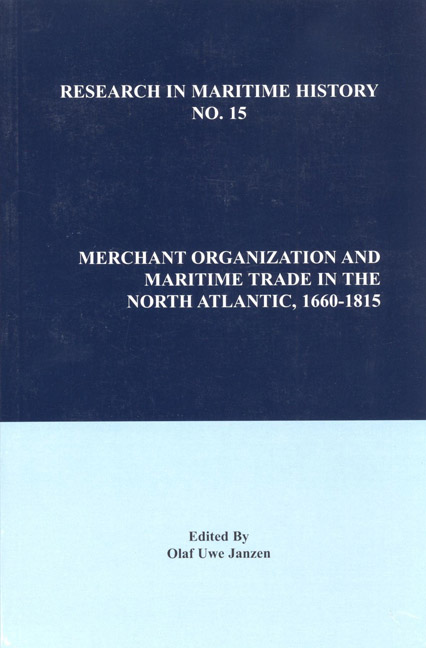Book contents
- Frontmatter
- Contents
- Contributors
- Preface
- CONTRIBUTIONS
- “Introduction”
- “The Gaigneur Clan in the Seventeenth-Century Canada Trade”
- “Credit, Risk and Reputation in Late Seventeenth- Century Colonial Trade”
- “The Huguenot Diaspora and the Development of the Atlantic Economy: Huguenots and the Growth of the South Carolina Economy, 1680-1775”
- “Breaching the Mercantile Barriers of the Dutch Colonial Empire: North American Trade with Surinam during the Eighteenth Century”
- “A Scottish Venture in the Newfoundland Fish Trade, 1726-1727”
- “The Consolidation of Bilbao as a Trade Centre in the Second Half of the Seventeenth Century”
- “Cutting Out The Middleman? American Trade In Northern Europe, 1783-1815”
- “A Vital Link in Wartime: The Organization of a Trade and Shipping Network Between the United States and Bordeaux, 1793-1815”
- “The Challenge of War on Maritime Trade in the North Atlantic: The Case of the British Trade to Iceland During the Napoleonic Wars”
“The Huguenot Diaspora and the Development of the Atlantic Economy: Huguenots and the Growth of the South Carolina Economy, 1680-1775”
from CONTRIBUTIONS
- Frontmatter
- Contents
- Contributors
- Preface
- CONTRIBUTIONS
- “Introduction”
- “The Gaigneur Clan in the Seventeenth-Century Canada Trade”
- “Credit, Risk and Reputation in Late Seventeenth- Century Colonial Trade”
- “The Huguenot Diaspora and the Development of the Atlantic Economy: Huguenots and the Growth of the South Carolina Economy, 1680-1775”
- “Breaching the Mercantile Barriers of the Dutch Colonial Empire: North American Trade with Surinam during the Eighteenth Century”
- “A Scottish Venture in the Newfoundland Fish Trade, 1726-1727”
- “The Consolidation of Bilbao as a Trade Centre in the Second Half of the Seventeenth Century”
- “Cutting Out The Middleman? American Trade In Northern Europe, 1783-1815”
- “A Vital Link in Wartime: The Organization of a Trade and Shipping Network Between the United States and Bordeaux, 1793-1815”
- “The Challenge of War on Maritime Trade in the North Atlantic: The Case of the British Trade to Iceland During the Napoleonic Wars”
Summary
In the late seventeenth century, Louis XIV's persecution of French Protestants or Huguenots, culminating in the Revocation of the Edict of Nantes of 1685, led to a massive flight of Huguenots from France and their diaspora among a number of neighbouring countries, including Holland, Prussia, Switzerland and England. The vast majority of the 50,000 Huguenots who went to England settled permanently in the country but about 2000 moved on to British America in the late seventeenth and early eighteenth centuries. These transatlantic migrants established substantial communities in three colonies - South Carolina, Massachusetts and New York - but it was in South Carolina that they had their greatest effect on the economic and social evolution of British America. The great majority of migrants to South Carolina arrived in the years 1680-1695, shortly after “Carolina” was founded in 1670. Most of the Huguenots who fled from France to England in the late seventeenth century were middle-aged or elderly, but the migrants to South Carolina were predominantly young, single or married adults, as older refugees were not generally prepared to suffer the hardships involved in crossing the Atlantic and settling in a new colony. By c. 1700, there were 400-500 migrants in the colony and some 100 children born to Huguenot parents in America, comprising about fifteen to eighteen percent of South Carolina's white population of 3250.
Jon Butler has provided the most compelling thesis on the character of the Huguenot migration to South Carolina and its impact on the colony's economic and social development. He argues that Huguenot migrants to America were generally poor and that many had spent several years in England living wholly or partly on charity before migrating overseas. He also shows that migrants were rich in human capital, bringing with them a wide range of artisanal and industrial skills, but that in practice these skills were of scant value in a frontier colony like South Carolina, where the population's small size and limited wealth produced little demand for specialised craftsmen. Besides, the future of the colony lay not in sericulture, linen weaving or in the dozens of other crafts practised by the Huguenots but in the slave-plantation production of naval stores, rice, and indigo — the export staples that dominated the South Carolina economy from 1700 to the Revolution.
- Type
- Chapter
- Information
- Publisher: Liverpool University PressPrint publication year: 2017



